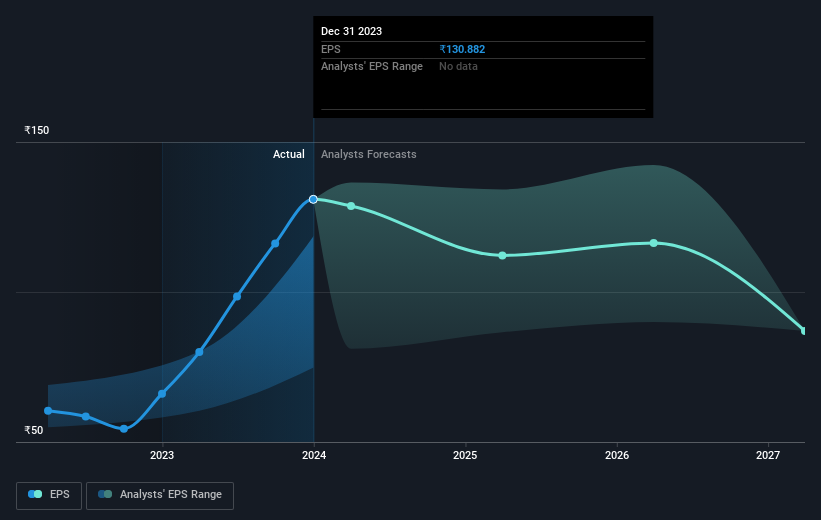Stock Analysis
- India
- /
- Gas Utilities
- /
- NSEI:MGL
Mahanagar Gas' (NSE:MGL) 12% CAGR outpaced the company's earnings growth over the same five-year period

If you buy and hold a stock for many years, you'd hope to be making a profit. Better yet, you'd like to see the share price move up more than the market average. But Mahanagar Gas Limited (NSE:MGL) has fallen short of that second goal, with a share price rise of 52% over five years, which is below the market return. However, more recent buyers should be happy with the increase of 44% over the last year.
Since the stock has added ₹4.7b to its market cap in the past week alone, let's see if underlying performance has been driving long-term returns.
View our latest analysis for Mahanagar Gas
There is no denying that markets are sometimes efficient, but prices do not always reflect underlying business performance. By comparing earnings per share (EPS) and share price changes over time, we can get a feel for how investor attitudes to a company have morphed over time.
During five years of share price growth, Mahanagar Gas achieved compound earnings per share (EPS) growth of 20% per year. This EPS growth is higher than the 9% average annual increase in the share price. So it seems the market isn't so enthusiastic about the stock these days. This cautious sentiment is reflected in its (fairly low) P/E ratio of 11.07.
The image below shows how EPS has tracked over time (if you click on the image you can see greater detail).

It is of course excellent to see how Mahanagar Gas has grown profits over the years, but the future is more important for shareholders. If you are thinking of buying or selling Mahanagar Gas stock, you should check out this FREE detailed report on its balance sheet.
What About Dividends?
As well as measuring the share price return, investors should also consider the total shareholder return (TSR). Whereas the share price return only reflects the change in the share price, the TSR includes the value of dividends (assuming they were reinvested) and the benefit of any discounted capital raising or spin-off. Arguably, the TSR gives a more comprehensive picture of the return generated by a stock. We note that for Mahanagar Gas the TSR over the last 5 years was 74%, which is better than the share price return mentioned above. The dividends paid by the company have thusly boosted the total shareholder return.
A Different Perspective
Mahanagar Gas provided a TSR of 48% over the year (including dividends). That's fairly close to the broader market return. Most would be happy with a gain, and it helps that the year's return is actually better than the average return over five years, which was 12%. It is possible that management foresight will bring growth well into the future, even if the share price slows down. While it is well worth considering the different impacts that market conditions can have on the share price, there are other factors that are even more important. Case in point: We've spotted 2 warning signs for Mahanagar Gas you should be aware of, and 1 of them is significant.
Of course Mahanagar Gas may not be the best stock to buy. So you may wish to see this free collection of growth stocks.
Please note, the market returns quoted in this article reflect the market weighted average returns of stocks that currently trade on Indian exchanges.
Valuation is complex, but we're helping make it simple.
Find out whether Mahanagar Gas is potentially over or undervalued by checking out our comprehensive analysis, which includes fair value estimates, risks and warnings, dividends, insider transactions and financial health.
View the Free AnalysisHave feedback on this article? Concerned about the content? Get in touch with us directly. Alternatively, email editorial-team (at) simplywallst.com.
This article by Simply Wall St is general in nature. We provide commentary based on historical data and analyst forecasts only using an unbiased methodology and our articles are not intended to be financial advice. It does not constitute a recommendation to buy or sell any stock, and does not take account of your objectives, or your financial situation. We aim to bring you long-term focused analysis driven by fundamental data. Note that our analysis may not factor in the latest price-sensitive company announcements or qualitative material. Simply Wall St has no position in any stocks mentioned.
About NSEI:MGL
Mahanagar Gas
Mahanagar Gas Limited operates as a natural gas distribution company in India.
Outstanding track record with excellent balance sheet and pays a dividend.

